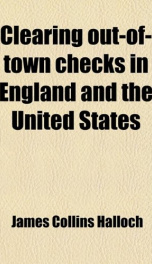clearing out of town checks in england and the united states

Purchase of this book includes free trial access to www.million-books.com where you can read more than a million books for free. This is an OCR edition with typos. Excerpt from book: CHAPTER I. THE ECONOMY OF CLEARING CHECKS. Fifty Accounts where One does NowA Rudimentary ClearingSuperfluous Trips ContinuedBank Settled with Bank Weekly Amazing Economies through Clearing. IN 1853 the banks of New York City organized a clearing-housethe first in America. Until then they had done business without one. The method had been laborious. FIFTY ACCOUNTS WHERE ONE DOES NOW. Each of the fifty-two banks had daily received over its counter or by mail checks on every other bank in town. To collect them the banks had opened deposit accounts with one another. Each had become a depositor in fifty-one city banks. Each also had had the others as depositors and kept fifty-one accounts with them. The pass-books used had been of the ordinary form, as "Merchants' Bank, in account with Chatham Bank." According to the common usage of depositors, each bank would have sent messengers to fifty-one banks daily and each would have had fifty-one messengers come to its own counter from the other banks. They had done a little better than that. The Chatham Bank, for instance, would have checks on the Merchants' Bank. It would list them on a deposit slip, charge the Merchants' Bank with the amount in its pass-book and place the checks in the book which the messenger would now carry to the Merchants' Bank and deliver to its receiving teller. The latter would remove the checks and, having some on the Chatham Bank with list attached, he would credit his chapter{Section 4bank with the amount in the pass-book, place the package in it and hand it back thus refilled to the messenger. A RUDIMENTARY CLEARING. This exchange of checks by two banks at the counter of one was a rudimentary clearing which, like all bank clearings, saved labor, time and trouble. To deposit these...
Info about the book
Author:
Series:
Unknown
ISBN:
0415528542
Rating:
3/5 (4)Your rating:
0/5
Languge:
English
Users who have this book
Users who want this book
What readers are saying
What do you think? Write your own comment on this book!
write a commentGenre
if you like clearing out of town checks in england and the united states try:
Other books by this author
Do you want to exchange books? It’s EASY!
Get registered and find other users who want to give their favourite books to good hands!


